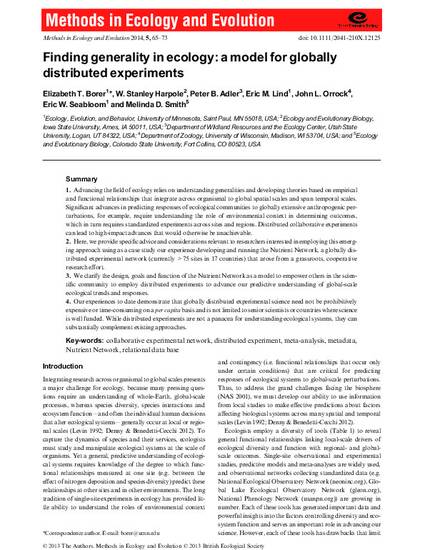
Article
Finding generality in ecology: a model for globally distributed experiments
Methods in Ecology and Evolution
(2014)
Abstract
- Advancing the field of ecology relies on understanding generalities and developing theories based on empirical and functional relationships that integrate across organismal to global spatial scales and span temporal scales. Significant advances in predicting responses of ecological communities to globally extensive anthropogenic perturbations, for example, require understanding the role of environmental context in determining outcomes, which in turn requires standardized experiments across sites and regions. Distributed collaborative experiments can lead to high‐impact advances that would otherwise be unachievable.
- Here, we provide specific advice and considerations relevant to researchers interested in employing this emerging approach using as a case study our experience developing and running the Nutrient Network, a globally distributed experimental network (currently >75 sites in 17 countries) that arose from a grassroots, cooperative research effort.
- We clarify the design, goals and function of the Nutrient Network as a model to empower others in the scientific community to employ distributed experiments to advance our predictive understanding of global‐scale ecological trends and responses.
- Our experiences to date demonstrate that globally distributed experimental science need not be prohibitively expensive or time‐consuming on a per capita basis and is not limited to senior scientists or countries where science is well funded. While distributed experiments are not a panacea for understanding ecological systems, they can substantially complement existing approaches.
Disciplines
Publication Date
2014
DOI
https://doi.org/10.1111/2041-210X.12125
Publisher Statement
DOI: 10.1111/2041-210X.12125
Citation Information
Peter B. Adler. "Finding generality in ecology: a model for globally distributed experiments" Methods in Ecology and Evolution Vol. 5 Iss. 1 (2014) Available at: http://works.bepress.com/peter_adler/52/
